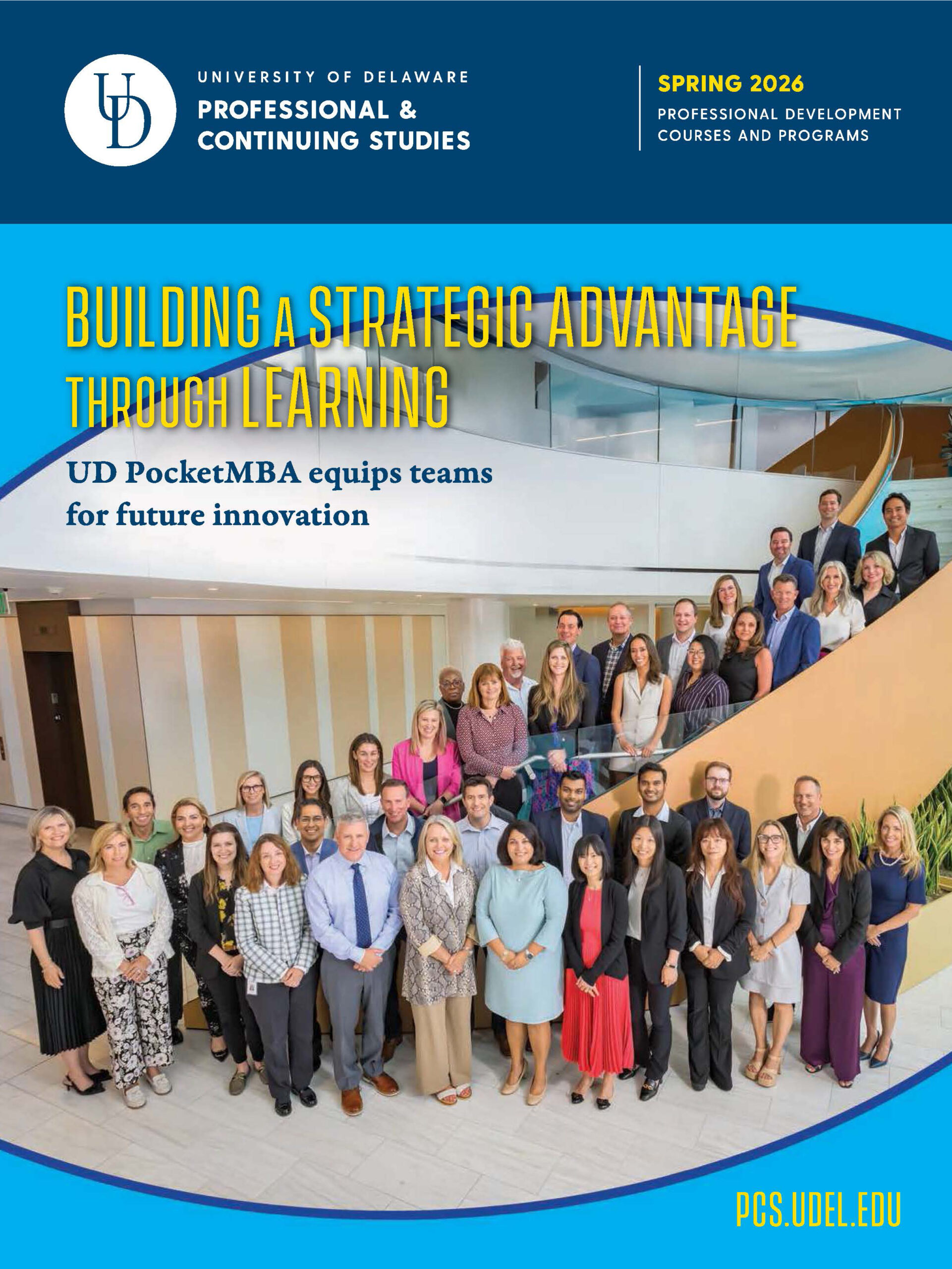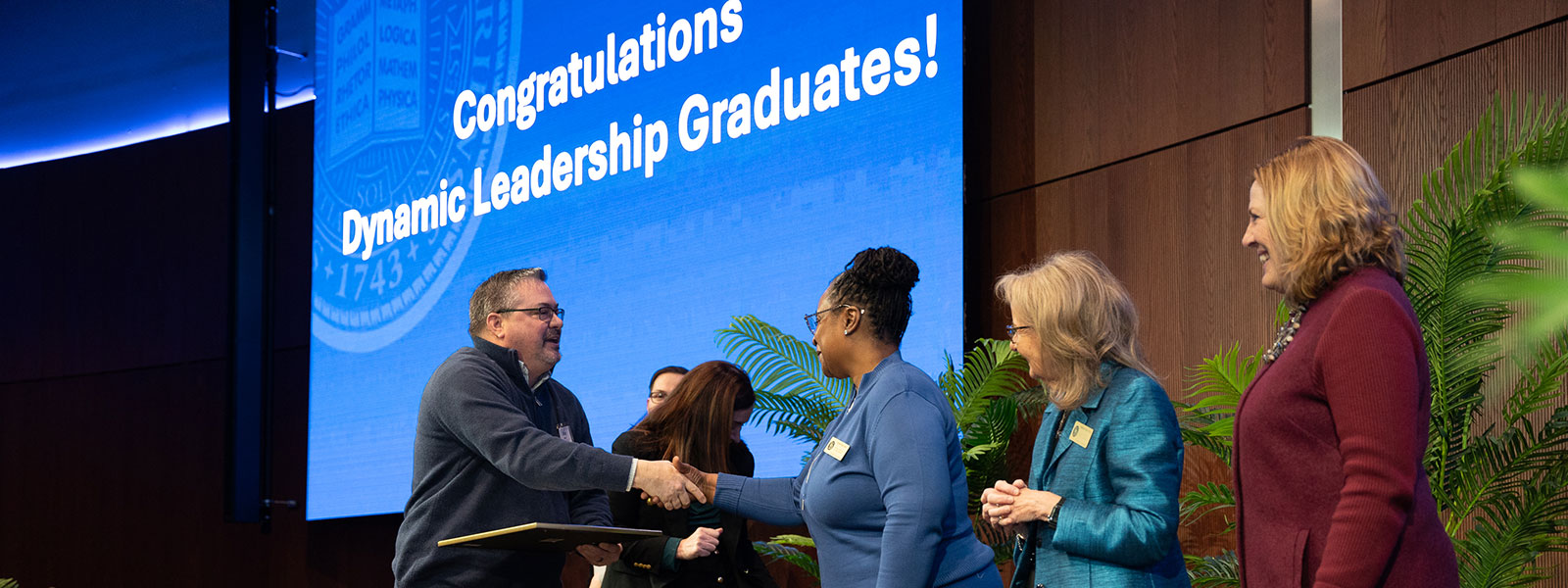
Applied learning in leadership, grounded in research
Registration for the spring 2026 program is closed.
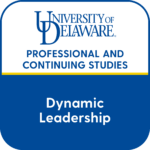
- Understand what dynamic leadership is and how to implement its principles in your own leadership identity
- Develop essential skills in communication, relationship-building and strategic thinking to open new career opportunities
- Gain confidence in your ability to lead and manage teams effectively
- 15-week hybrid course consisting of 18 hours of asynchronous online learning, 12 hours of live-online sessions and six hours of in-person learning and networking
- Designed for anyone working in any type of organization, including businesses and nonprofits
- Discounts, payment plan, scholarships available
- LEARN MORE — View an instructor info presentation

Dynamic leadership is a style of leadership that emphasizes adaptability, creativity and agility to navigate complex challenges and seize new opportunities. Unlike traditional leadership styles that may rely on rigid rules and procedures, dynamic leadership focuses on flexibility, innovation and the ability to respond quickly to changing circumstances.
This 15-week certificate program is designed for new or emerging leaders, including those with technical backgrounds moving into leadership roles. Focusing on three pillars — leading self, leading others and leading the organization — the hybrid program combines online learning with in-person, cohort-based networking and peer learning sessions. Participants will gain skills, insights and strategies for contributing to the success and growth of an organization through effective leadership practices.
For the full schedule, including in-person, live-online and self-paced weeks, as well as a sample justification letter to present to your employer for approval to enroll in the program, please submit a request via our program inquiry form.
Inside UD’s Dynamic Leadership Program
Discover how the University of Delaware’s Dynamic Leadership Program empowers professionals to lead with clarity, confidence and purpose.
REGISTRATION AND SCHEDULE
Dynamic Leadership Certificate – Noncredit Certificate — Registration for the spring 2026 program is closed.
Group enrollment rates: 2-4 participants: $2,975 each; 5-9 participants: $2,500 each. If your organization is interested in 10 or more seats, please fill out the information form below to learn more about our customized learning and organizational training. |
PROGRAM DETAILS
Who should participate in this program?
- New or aspiring leaders within an organization
- Existing technical leaders who seek to enhance business and leadership acumen
- Identified high potential employees poised for management roles
Participants can self-enroll or be nominated by supervisors
Instructors
 | Dustin J. Sleesman is the program director for Dynamic Leadership certificate program and an associate professor of management at the University of Delaware’s Alfred Lerner College of Business and Economics. He holds a doctorate from Michigan State University and dual bachelor’s degrees from Ohio State University. His research focuses on organizational behavior, particularly decision commitment, negotiation, conflict resolution and team effectiveness. Sleesman’s work has been published in top academic journals like the Academy of Management Journal and Journal of Applied Psychology. He has received several accolades, including UD’s Outstanding Junior Faculty Award, the Dean’s Office Research Recognition Award and the Best Empirical or Theoretical Paper Award from the Academy of Management’s Conflict Management division.
|
 | Kidde Kelly joined the University of Delaware’s Division of Professional and Continuing Studies (UD PCS) as a subject matter expert in 2023. She holds a doctorate of business administration from Liberty University and bachelor’s and master’s degrees from Strayer University. With extensive corporate experience, she has led human resources teams in Fortune 500 companies and smaller entities. In 2018, she founded The Catalyst for Discovery Group, LLC, an HR coaching and consulting organization. Recognized as a dynamic HR leader, she has received numerous accolades, including Woman of the Year by the National Association of Professional Women. Kelly is certified as an executive coach and human capital strategist.
|
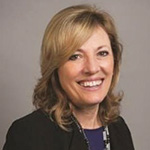 | Rita Landgraf joined the University of Delaware’s College of Health Sciences in 2017 as professor of practice and distinguished health and social services administrator in residence. She directs the UD Partnership for Healthy Communities, a cross-college, cross-state initiative. From 2009 to 2017, she served as cabinet secretary of the Delaware Department of Health and Social Services under Gov. Jack Markell. She led efforts to meet the U.S. Department of Justice Settlement Agreement, promoting recovery and community integration for individuals with serious mental illness. Landgraf also oversaw the state’s implementation of the Affordable Care Act.
|
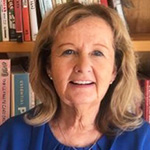 | Kathleen (Kathy) S. Matt earned her bachelor’s and master’s degrees in biology from the University of Delaware and her doctorate from the University of Washington, Seattle. She has extensive teaching experience and has mentored many graduate students in her biomedical research lab. Her research, funded by the National Institutes of Health (NIH), the National Arthritis Foundation and NASA, focuses on stress and its linkages to disease. Matt served as executive director of the Delaware Health Sciences Alliance and dean of the UD's College of Health Sciences from 2009 to 2022. She co-chairs the Health Workforce Subcommittee and chairs the Delaware Institute of Medical Education and Research.
|
 | John Stocker is an associate professor of finance at the University of Delaware’s Alfred Lerner College of Business and Economics and an experienced educator and practitioner who has taught across the United States, southeastern Europe, Central Asia and the Far East. He has developed courses in accounting, finance and business planning, and launched Bulgaria’s first chartered financial analyst (CFA) review course. He also designed a business training and consulting training entity that continued there after a successful U.S. Agency for International Development program. Stocker served as the primary liaison for a $10 million project to establish a western MBA in Bosnia. His consulting work includes restructuring a failed aircraft manufacturing facility in Germany and securing funding for a startup insurance company in the U.K. He has raised over $25 million for firms in southeastern Europe. |
Course outline
Part 1: Leading Self
Module 1: Personal Effectiveness
- Examine the qualities that make effective leaders and select which qualities to develop individually.
- Evaluate various strategies for setting and achieving goals and create plans to execute them.
- Apply the elements of time management to incorporate in daily plans to improve effectiveness as a leader.
- Learn how to maximize performance through the achievement of balance, enhanced well-being and development of resilience.
Module 2: Your Leadership Identity
- Distinguish between management and leadership.
- Describe leadership identity and personal values.
- Develop SMART goals for an individual development plan.
- Relate cultural competence to inclusive behaviors for leaders.
Part 2: Leading Others
Module 3: Building Relationships
- Explore the complexities of trust and learn how to build trust with others.
- Examine different forms of conflict to gain an awareness of how to work through disagreements.
- Articulate key aspects of difficult conversations and understand how to navigate them.
Module 4: Leading Teams
- Distinguish factors that impact planning through the motivation of each team member.
- Align your team with a common motivational vision and a set of operating behaviors.
- Construct plans to operationalize and monitor the team’s performance for continuous improvement.
Part 3: Leading Organizations
Module 5: Financial Acumen
- Use financial management tools to make informed decisions and drive organizational success.
- Describe the symbiotic relationship between strategic planning and financial management, and how effective integration of the two can optimize organizational performance.
- Articulate and communicate financial data and insights effectively to diverse stakeholders, enabling informed decision-making and fostering organizational transparency and trust.
Module 6: Leading Change
- Summarize and present what was learned in the course as it relates to culture and managing change.
- Distinguish between the various guiding principles associated with leading change.
- Identify what was learned in the program that may be applied toward effectively communicating vision.
Current and past speakers
- Cathy Kanesfsky, President and CEO, Food Bank of Delaware
- Sunaina V. Soares, Vice President of Human Resources, Goodwill of Delaware and Delaware County
Grading policy
This program is pass/fail. To earn a certificate of completion, participants must:
- Successfully complete all assignments in a module.
- Pass assessments that will include all synchronous and asynchronous assignments.
- Complete all six modules and attend all in-person sessions.
Learner outcomes
Upon completion of this course, participants will:
- Embark on a journey to become a more insightful leader by developing their own leadership identity and improving their personal and professional effectiveness.
- Develop individualized strategies to build strong professional relationships and to lead high-performing teams.
- Explore the role of leadership within a broader organizational context by learning about how to lead change in organizations.
- Interpret business results and make informed strategic decisions by demonstrating financial acumen.
- Immediately apply lessons from cutting-edge research and develop adaptable skills in their current role to prepare for career growth as a leader.
- Develop the ability to visualize, plan and execute strategies to achieve personal and organizational goals.
- Have tangible and actionable next steps to continue their leadership development path at work.
- Be equipped with tools to create a leadership development plan that allows them to work with a mentor and translate their learning experience into tangible ways to enhance their leadership journey in their organization.
Technology requirements
Students need their own computer and reliable internet access.

